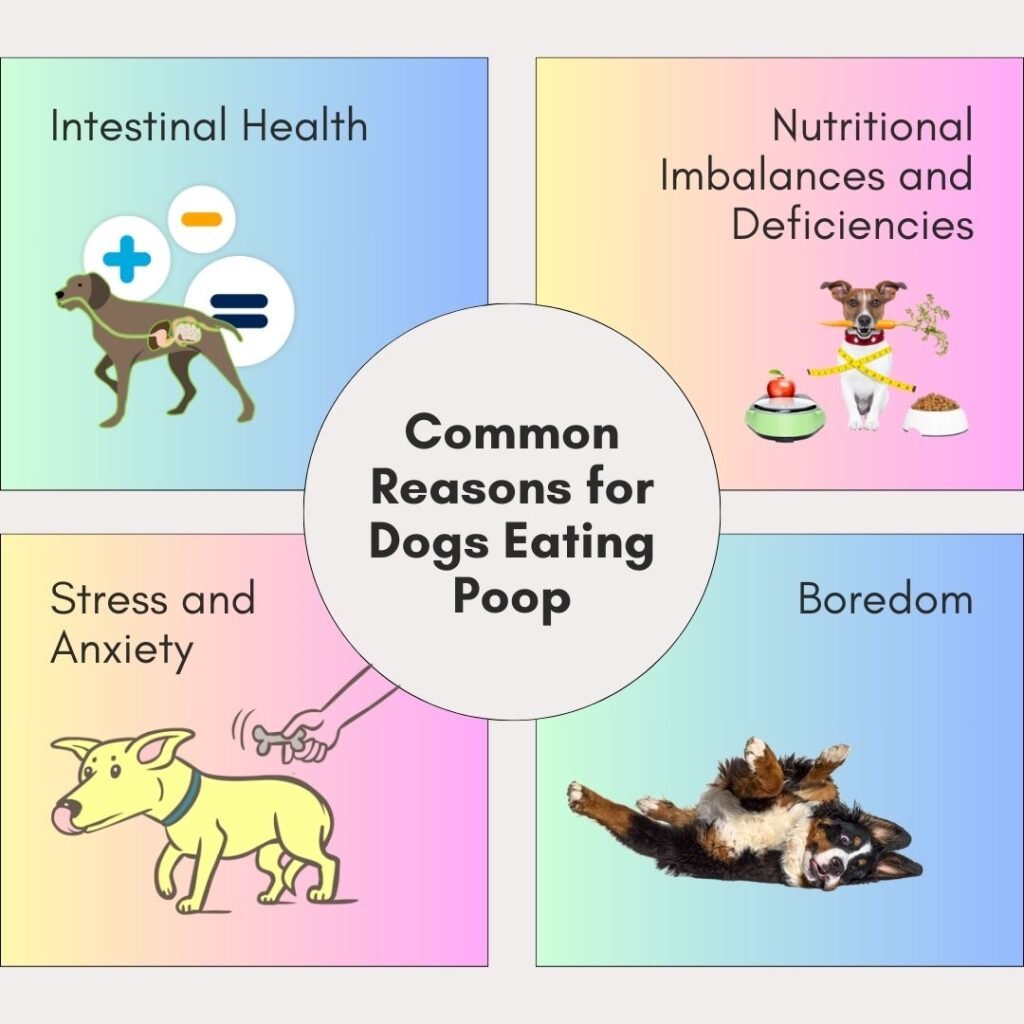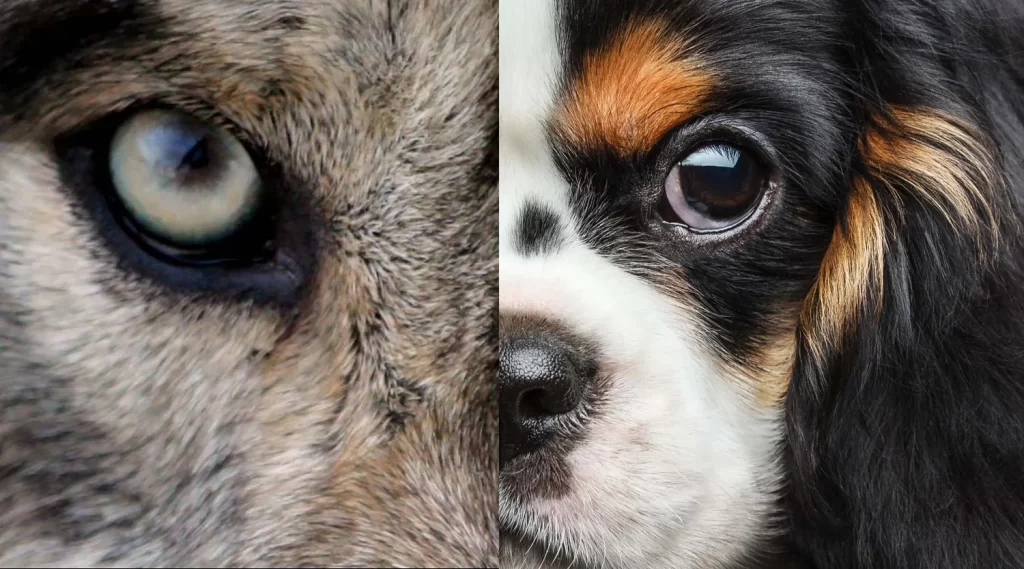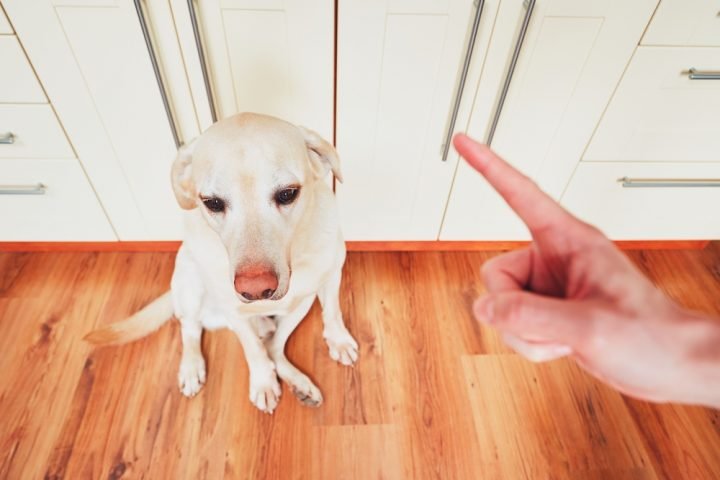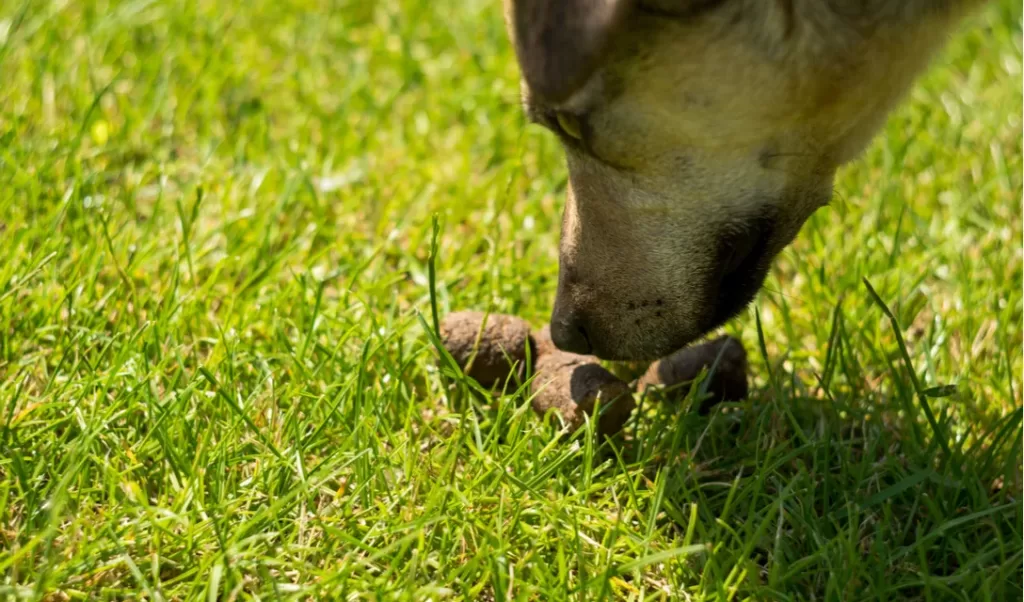Coprophagia is the scientific term for the behavior of eating feces. It is a common and often frustrating problem for many dog owners, who may find it disgusting, unhealthy, and embarrassing. In this guide, we will explore the possible reasons why dogs eat poop, the importance of addressing the behavior, and the effective ways to stop it.
Table of Contents
Explanation of Coprophagia in Dogs
Coprophagia can occur in dogs of any age, breed, or gender. It can involve eating their own poop, other dogs’ poop, or other animals’ poop. Some dogs may eat poop occasionally, while others may do it regularly. There are many factors that can influence coprophagia, such as medical conditions, nutritional deficiencies, environmental factors, behavioral issues, and psychological factors.
Common Reasons for Dogs Eating Poop

The exact cause of coprophagia in dogs is not fully understood, and it may vary from dog to dog. However, some of the common reasons are:
Intestinal Health
Some dogs may eat poop to improve their intestinal health, especially if they have digestive problems, parasites, or infections. Eating poop can provide them with beneficial bacteria, enzymes, or nutrients that can help them digest their food better or fight off pathogens. However, this can also expose them to harmful bacteria, viruses, or parasites that can cause more health problems.
Nutritional Imbalances and Deficiencies
Some dogs may eat poop to compensate for nutritional imbalances or deficiencies in their diet. This can happen if they are fed low-quality food, have food allergies or intolerances, or have metabolic disorders that affect their nutrient absorption. Eating poop can provide them with some vitamins, minerals, or proteins that they are lacking. However, this can also lead to overconsumption of certain nutrients or toxins that can be harmful to their health.
Stress and Anxiety
Some dogs may eat poop to cope with stress and anxiety, especially if they have experienced trauma, abuse, neglect, or separation anxiety. Eating poop can provide them with comfort, security, or relief from their negative emotions. However, this can also worsen their mental health and create a vicious cycle of stress and coprophagia.
Boredom
Some dogs may eat poop to relieve boredom, especially if they are left alone for long periods, have insufficient exercise, stimulation, or socialization, or have a lack of toys or games. Eating poop can provide them with entertainment, curiosity, or fun. However, this can also become a habit or an addiction that is hard to break.
Importance of Addressing the Behavior
Coprophagia in dogs is not only unpleasant, but also potentially dangerous. It can cause various health problems, such as:
- Dental problems, such as bad breath, tooth decay, or gum disease
- Gastrointestinal problems, such as diarrhea, vomiting, or constipation
- Parasitic infections, such as roundworms, tapeworms, or giardia
- Bacterial infections, such as salmonella, E. coli, or campylobacter
- Viral infections, such as parvovirus, coronavirus, or distemper
- Toxicity, such as from medications, pesticides, or poisons
Coprophagia can also affect the relationship between the dog and the owner, as well as other people or animals. It can cause:
- Social stigma, such as being shunned, rejected, or ridiculed by other dog owners, neighbors, or strangers
- Behavioral problems, such as aggression, dominance, or territoriality
- Psychological problems, such as low self-esteem, depression, or anxiety
Therefore, it is important to address the behavior as soon as possible, and seek professional help if needed.
Exploring the Genetic Link Between Dogs and Wolves

One of the possible explanations for coprophagia in dogs is their genetic link to wolves, their wild ancestors. Wolves are known to eat poop for various reasons, such as:
- Survival, such as to avoid starvation, scavenge for food, or hide their tracks from predators or rivals
- Communication, such as to mark their territory, signal their status, or share information
- Health, such as to cleanse their system, balance their pH, or boost their immunity
Some researchers suggest that dogs may have inherited some of these instincts from wolves, and that coprophagia may be a natural or adaptive behavior for them. However, this does not mean that coprophagia is acceptable or beneficial for dogs, especially in the modern domesticated environment. Dogs have evolved to live with humans, and their dietary and behavioral needs have changed accordingly. Therefore, coprophagia should be discouraged and prevented in dogs, as it can cause more harm than good.
How Ancestral Traits Influence Canine Behavior Patterns Like Coprophagia
Another way to understand coprophagia in dogs is to look at how their ancestral traits influence their behavior patterns. Dogs are descended from wolves, and they share many characteristics with them, such as:
- Pack mentality, such as to form social bonds, follow a hierarchy, or cooperate with others
- Predatory instinct, such as to hunt, chase, or kill prey
- Scavenging instinct, such as to explore, investigate, or consume anything edible
- Curiosity, such as to learn, discover, or experiment with new things
These traits can help dogs survive and thrive in the wild, but they can also cause problems in the domesticated setting. For example, dogs may eat poop because:
- They are mimicking their pack leader, who may eat poop to clean up the den, protect the pups, or assert dominance
- They are satisfying their predatory instinct, which may be triggered by the smell, taste, or movement of poop
- They are following their scavenging instinct, which may be stimulated by the availability, variety, or novelty of poop
- They are expressing their curiosity, which may be aroused by the texture, color, or shape of poop
These behaviors may be natural or instinctive for dogs, but they are not appropriate or healthy for them. Therefore, dog owners should understand and respect their dogs’ ancestral traits, but also train and guide them to behave in a civilized and safe manner.
The Role of Attention-Seeking in Reinforcing Poop-Eating Tendencies
One of the common mistakes that dog owners make when dealing with coprophagia is to give their dogs too much attention, either positive or negative, when they eat poop. This can reinforce the poop-eating tendencies, as dogs may learn that eating poop is a way to get attention from their owners. For example, dogs may eat poop because:
- They are seeking positive attention, such as praise, affection, or rewards
- They are seeking negative attention, such as scolding, yelling, or punishment
- They are seeking any attention, such as eye contact, interaction, or reaction
Dogs are social animals, and they crave attention from their owners. However, they do not always distinguish between good and bad attention, and they may repeat any behavior that gets them attention. Therefore, dog owners should avoid giving their dogs attention when they eat poop, and instead ignore or redirect them to something else. They should also give their dogs plenty of attention when they do something good, such as playing, obeying, or performing tricks.
Also Read: 4 Strong Reasons Why Dogs Keep Yelping in Pain Randomly
Examining Anxiety and Stress as Underlying Causes of Coprophagia in Dogs
Another factor that can contribute to coprophagia in dogs is anxiety and stress, which can affect their mental and emotional well-being. Anxiety and stress can be caused by various factors, such as:
- Environmental changes, such as moving, traveling, or remodeling
- Social changes, such as adding, losing, or replacing a family member, pet, or friend
- Routine changes, such as changing the feeding, walking, or sleeping schedule
- Physical changes, such as aging, illness, or injury
- Psychological changes, such as fear, trauma, or insecurity
Anxiety and stress can make dogs feel nervous, restless, or unhappy, and they may resort to eating poop to cope with their feelings. Eating poop can provide them with a sense of comfort, control, or relief, as well as a distraction from their problems. However, this can also aggravate their anxiety and stress, and create a vicious cycle of emotional distress and coprophagia.
Therefore, dog owners should identify and address the sources of anxiety and stress in their dogs, and help them overcome their issues. They should also provide their dogs with a calm, stable, and supportive environment, where they can feel safe, loved, and happy.
How Fear of Punishment Can Contribute to This Behavior Problem

One of the worst things that dog owners can do when dealing with coprophagia is to punish their dogs for eating poop. This can not only be ineffective, but also counterproductive, as it can contribute to this behavior problem. For example, dogs may eat poop because:
- They are afraid of being punished for pooping in the wrong place, such as inside the house, on the carpet, or on the furniture
- They are trying to hide the evidence of their pooping, such as by eating it, burying it, or covering it
- They are confused by the mixed signals from their owners, such as being praised for pooping outside, but scolded for eating it
Punishment can make dogs feel scared, angry, or resentful, and it can damage the trust and bond between them and their owners. It can also make them associate pooping with negative consequences and eating poop with positive outcomes. Therefore, dog owners should never punish their dogs for eating poop, and instead use positive reinforcement and gentle correction to teach them the proper way to live.
How to Stop Coprophagia in Dogs
Coprophagia in dogs can be a challenging and frustrating behavior to deal with, but it is not impossible to stop. There are various strategies that dog owners can use to prevent and correct this behavior, such as:
Consult a Veterinarian
The first step to stop coprophagia in dogs is to consult a veterinarian, who can rule out any medical causes or complications of the behavior. The veterinarian can perform a physical examination, blood tests, stool analysis, or other diagnostic tests to check for any underlying health issues, such as parasites, infections, allergies, or metabolic disorders. The veterinarian can also prescribe any medications, supplements, or dietary changes that can help improve the dog’s intestinal health and nutritional balance.
Clean Up After the Dog
The second step to stop coprophagia in dogs is to clean up after the dog, who can remove any access or opportunity to eat poop. The dog owner should pick up the dog’s poop as soon as possible, and dispose of it properly. The dog owner should also keep the dog’s living area, such as the yard, kennel, or crate, clean and free of any feces. The dog owner should also avoid leaving the dog unsupervised or unattended in places where poop may be present, such as parks, trails, or farms.
Use Deterrents
The third step to stop coprophagia in dogs is to use deterrents, which can make the poop unappealing or unpleasant to eat. The dog owner can use natural or commercial products that can be added to the dog’s food or water, or applied to the poop, that can make the poop taste bitter, sour, or spicy. The dog owner can also use devices or gadgets that can emit sounds, vibrations, or shocks that can startle or discourage the dog from eating poop. However, the dog owner should be careful not to use any deterrents that can be harmful, toxic, or abusive to the dog.
Train the Dog
The fourth step to stop coprophagia in dogs is to train the dog, who can teach the dog the desired behavior and the consequences of the undesired behavior. The dog owner can use positive reinforcement and gentle correction to train the dog. For example, the dog owner can:
- Teach the dog the “leave it” command, which can instruct the dog to ignore or drop anything that is not allowed or safe to eat
- Teach the dog the “come” command, which can call the dog back to the owner’s side or away from the poop
- Teach the dog the “drop it” command, which can make the dog release anything that is in its mouth or that it has picked up
- Praise and reward the dog with treats, toys, or affection when it obeys the commands or avoids eating poop
- Ignore or redirect the dog when it tries to eat poop or shows interest in poop
- Never punish, scold, or hit the dog for eating poop or pooping in the wrong place, as this can make the behavior worse
Provide the Dog with Enough Exercise, Stimulation, and Socialization
The fifth step to stop coprophagia in dogs is to provide the dog with enough exercise, stimulation, and socialization, which can reduce the dog’s boredom, stress, and anxiety, and increase the dog’s happiness and well-being. The dog owner should:
- Walk the dog at least twice a day, for at least 30 minutes each time, and vary the routes and destinations
- Play with the dog regularly, and provide the dog with a variety of toys and games that can challenge the dog’s physical and mental abilities
- Enroll the dog in obedience classes, agility courses, or other activities that can teach the dog new skills and improve the dog’s confidence and discipline
- Introduce the dog to other dogs, people, or animals that can be friendly and compatible with the dog, and allow the dog to socialize and interact with them
- Spend quality time with the dog, and give the dog plenty of attention, affection, and praise
Conclusion
Encouraging your dog to stop eating poop is a crucial step in ensuring their health and well-being. By understanding the various reasons behind coprophagia and implementing effective strategies, you can help your furry companion overcome this behavior.
Here’s a recap of key takeaways to address coprophagia in dogs:
- Positive Reinforcement: Utilize positive reinforcement techniques to redirect your dog’s attention away from feces and towards desirable behaviors.
- Consult a Veterinarian: Seek professional guidance from a veterinarian to rule out any underlying health issues that may be contributing to coprophagia.
- Environmental Enrichment: Provide mental and physical stimulation for your dog through interactive toys, engaging activities, and adequate exercise to alleviate boredom and reduce stress.
- Dietary Considerations: Evaluate your dog’s diet and consider making necessary adjustments, such as incorporating probiotics or vitamin supplements, to address potential nutritional deficiencies.
By taking proactive measures and being attentive to your dog’s needs, you can effectively combat coprophagia and promote a healthier lifestyle for your canine companion. Remember that patience, consistency, and a compassionate approach are essential in addressing this behavior. With dedication and proper intervention, you can help your dog overcome the habit of eating poop, leading to a happier and more fulfilling bond between you and your pet.

